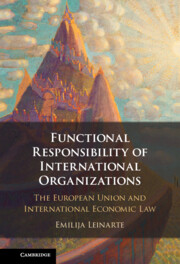 Functional Responsibility of International Organisations
Functional Responsibility of International Organisations from Part I - The Legal Foundations of the International Responsibility of the European Union
Published online by Cambridge University Press: 09 December 2021
The principle of joint responsibility is only halfway to solving the question of the international responsibility of the EU. That the EU and its Member States are independently responsible for their joint obligations does not necessarily mean that a breach will result in their joint and several responsibility. Chapter 4 accordingly addresses the exclusive responsibility of the EU and its Member States. This chapter explores the hypothesis suggested by the European Commission that authorities of the EU act as de facto organs of the Union when they implement EU law. For this purpose, this study delves into the travaux préparatoires of the ILC rules of responsibility to search for the concept of an organ and agent. It is suggested that while the ILC adopts a broad reading of these terms, international dispute-settlement practice does not support the European Commission’s claim that conduct of Member States’ organs is attributed to the EU when they carry out EU policies.
To save this book to your Kindle, first ensure no-reply@cambridge.org is added to your Approved Personal Document E-mail List under your Personal Document Settings on the Manage Your Content and Devices page of your Amazon account. Then enter the ‘name’ part of your Kindle email address below. Find out more about saving to your Kindle.
Note you can select to save to either the @free.kindle.com or @kindle.com variations. ‘@free.kindle.com’ emails are free but can only be saved to your device when it is connected to wi-fi. ‘@kindle.com’ emails can be delivered even when you are not connected to wi-fi, but note that service fees apply.
Find out more about the Kindle Personal Document Service.
To save content items to your account, please confirm that you agree to abide by our usage policies. If this is the first time you use this feature, you will be asked to authorise Cambridge Core to connect with your account. Find out more about saving content to Dropbox.
To save content items to your account, please confirm that you agree to abide by our usage policies. If this is the first time you use this feature, you will be asked to authorise Cambridge Core to connect with your account. Find out more about saving content to Google Drive.